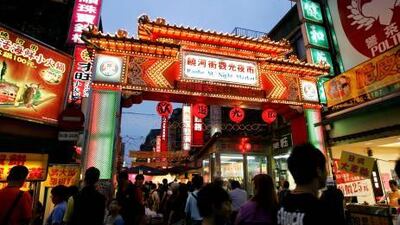Why Taipei
Taiwan's capital is one of Asia's most underrated and accessible cities. From the towering Taipei 101 to the sprawling night markets, Taipei's many faces reflect a vibrant and distinctive metropolis. Taiwan became the de facto guardian of many of China's cultural legacies after the Communist Revolution, and the religious, aesthetic and intellectual traditions of ancient China are very much alive in Taipei, and continue to evolve in compelling ways. In literature, fine art, dance, theatre, music, film - Taipei has been the epicentre of Taiwan's cultural contributions. Ringed by tropical mountains dotted with Japanese-style hot springs, hiking trails and tea houses, Taipei's frenetic downtown is never far from a peaceful place to unwind.
A comfortable bed
Taipei's most discerning weekenders are abuzz over the boutique hot spring hotel Villa 32 in Beitou (www.villa32.com; 00 886 2 6611 8888). Nestled in the foothills of Yangmingshan National Park, Beitou is known for its natural hot springs, enjoyed by the residents for their therapeutic benefits. With its minimalist design that emphasises the harmony of the natural surroundings, Villa 32 offers wellness, calm and luxury. Suites start at 16,000 New Taiwan dollars (Dh2,042) per night.
For a taste of the high life in the heart of downtown, the Shangri-La's Far Eastern Plaza (www.shangrila.com; 00 886 2 2378 8888) has fabulous views of Taipei 101, the world's second-tallest building. Double rooms start from NT$6,500 (Dh830) per night. Stylish travellers can also try the chic Hotel Éclat (www.eclathotels.com/taipei; 00 886 2 2784 8888). Contemporary art adorns the fanciful lobby and the rooms are luxuriously appointed with hi-tech gadgets. Deluxe rooms start at NT$5,950 (Dh761) per night.
Find your feet
The MRT subway system is clean and convenient, serving the city's most lively and important areas. Use an EasyCard pass (www.easycard.com.tw), available in all MRT stations as well as in convenient stores - to ride the trains at a 20 per cent discount. Taxis are a fast and reliable alternative. To get your bearings, get off at Chiang Kai-shek Memorial Hall MRT station. Stroll through the plaza and park honouring the Chinese nationalist leader as residents jog and practice martial arts. One block to the west of the National Central Library is the verdant and serene 228 Peace Memorial Park - named for the date of a brutal episode of civilian suppression in 1947. Beyond this park to the north begins the sprawling commercial area, which extends all the way to Ximen - the site of the original city's western gate and today one of the hippest shopping and entertainment districts. The Taipei Times is an English-language daily paper that lists events around town.
Meet the locals
Taipei has no less than 20 night markets - most of which are warrens of nondescript alleys by day that spring to life after 6pm with vendors and crowds. Every market draws thousands night after night to graze on the cornucopia of snacks, browse the dizzying array of goods or simply roam through the spectacle. Shilin, the largest and most famous market, features an open-air dining hall that consolidates many of Taiwan's most storied bites, from oyster omelettes and stinky tofu to tempura and lemon-fig jelly.
On the northernmost stop of the MRT's red line is Danshui, a promenade popular for the romantic glow the setting sun throws on the river. Sip customised bubble tea and discover wonders such as the chewy sticky rice mochi stuffed with black sesame paste, or fresh mango over shaved ice – the ultimate refreshment on a hot day.
Book a table
Taipei is serious about good food. This is a city that loves to eat, whose chefs and restaurateurs revere culinary traditions while incorporating diverse influences and innovations. One bastion of authentic, upscale Taiwanese cuisine is Shin Yeh 101 (www.shinyeh.com.tw; 00 886 2 8101 0185), on the 85th floor of Taipei 101. The meticulously executed menu includes taro and shrimp roll appetisers, three-cup chicken and fresh seafood, capped by sublime almond pudding. Set dinners start from NT$1,600 (Dh204) per person. Reserve well in advance.
Another Taipei classic is Din Tai Fung (www.dintaifung.com.tw), a global chain legendary for its renditions of simple comfort foods: steamed dumplings, sautéed pea shoots and red-bean desserts. Check out the original branch that launched the empire on Yongkang Jie (00 886 2 2321 8928). Emblematic of Taipei's status as a culinary capital, the city recently welcomed a branch of L'Atelier de Joel Robuchon (www.joel-robuchon.net; 00 886 2 8729 2628), joining Hong Kong, Macao and Tokyo as Asian hosts to this Michelin-starred French restaurant. Robuchon's signature creations are available à la carte or as set meals starting from NT$6,000 (Dh766).
Shopper's paradise
While night markets are fun for a cheap browse, the city's well-heeled seek out designer goods at numerous luxury malls throughout the city, especially surrounding the Zhongxiao-Dunhua metro stop and clustered at the foot of Taipei 101. If you are in the market for jade, porcelain, painting, calligraphy or jewellery, visit the Chinese Handicraft Mart (www.handicraft.org.tw; 00 886 2 2393 3655), a few blocks south of the train station on Suzhou Road. Tea appreciators will probably return from Taiwan with a bounty: delicate leaves such as the prized tieguanyin are among the island's most famous exports. Although quality tea is relatively easy to find, serious aficionados should head to the Dadaocheng wholesale market - or to the Wenshan plantations in Muzha district.
What to avoid
The swarms of motorbikes. They dominate Taiwan's roads and compound the dangers for pedestrians and bikers alike.
Don't miss
Although Chiang Kai-shek's nationalists couldn't pack up Beijing's Imperial Palace when they fled to Taiwan, they looted all the valuables they could carry. Head to the National Palace Museum for a glimpse of the spoils: the collection contains many of Chinese history's most precious and important works of art and artefacts.

